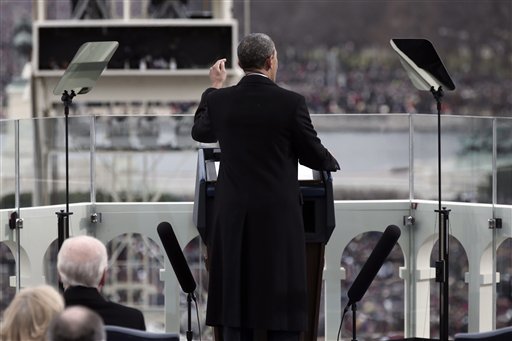It was either an embarrassing slip, or a frightening revelation of the president’s true worldview. Either way, the words “peace in our time,” made infamous by British Prime Minister Neville Chamberlain as he promised an illusory peace with Adolf Hitler in 1938, should never have been in President Barack Obama’s second inaugural address. Yet they were, and went virtually unnoticed until caught by conservatives on social media.
The phrase appeared in a passage on foreign policy, in which the president pledged to defend the nation while resolving differences peacefully [emphasis added]:
And we must be a source of hope to the poor, the sick, the marginalized, the victims of prejudice–not out of mere charity, but because peace in our time requires the constant advance of those principles that our common creed describes: tolerance and opportunity; human dignity and justice.
The sentence is rather tortured, but the idea seems to be that promoting socioeconomic equality around the world can help prevent conflict. It echoes the “root causes” theory of terrorism, which is that poverty produces extremism or at least provides it fertile ground There is some truth to that, although many terrorists come from middle class origins, and target America precisely because it symbolizes the values the president described.
Regardless, the reason Chamberlain’s “peace in our time” is remembered is not that his theory of international relations was wrong but because he was hopelessly, dangerously naïve about Hitler’s intentions. A year after Chamberlain waved the paper on which he had signed the Munich Agreement, ceding the sovereignty of Czechosolvakia in return for Hitler’s promises of peace, Germany had invaded Poland and Britain was at war.
President Obama shows similar naïveté, or hubris, about the war against international terrorism. “A decade of war is now ending,” he declared, even as a new front has opened in the war against Al Qaeda in Africa. He–ironically–failed to mention Afghanistan, where soldiers still fight and die in a cause President Obama has all but abandoned, and where America has already once suffered the brutal consequences of neglect.
Like Chamberlain, the president seems to believe in negotiation as an end in itself. He spent his first term seeking an elusive nuclear agreement with the Iranian regime, even permitting it to recover from a near-revolution in 2009, convinced that its assurances of peaceful intentions would be enough. He backed away from promises of missile defense to Poland and the Czech Republic–receiving nothing from Russia in return.
When Republicans called President Obama’s approach “appeasement,” he responded angrily: “Ask Osama bin Laden…whether I engage in appeasement.” Yet Obama has been trying to negotiate with the Taliban who once sheltered bin Laden and Al Qaeda, in an attempt to put a brave face on withdrawal. And Al Qaeda’s attacks on U.S. diplomatic missions in the Middle East on Sep. 11, 2012 suggest that it has not been deterred.
The president intends to continue pulling back. His nominees to foreign policy posts–John Kerry (State), Chuck Hagel (Defense), and John Brennan (CIA)–each share his vision of a humbler America. He pretends the alternative to his approach is “perpetual war.” But Ronald Reagan showed the merit of “peace through strength,” challenging Soviet aggression, standing up to terror and letting dissidents know they were not alone.
President Obama has shown a very selective interest in history, narrowly focused on the sites of civil rights struggles–Osawatomie, for example, and the three sites mentioned in his address. Beyond that familiar subject, he shows little sensitivity or expertise: he once flubbed the date of the Constitutional Convention, for example, and pulled out of the missile defense deal on the 60th anniversary of the Russian invasion of Poland.
History remembers Chamberlain’s “peace in our time” as the definitive statement of appeasement, which is precisely why its use in the president’s inaugural address is so odd, and ominous. It is possible that it was simply the error of a young speechwriter. But the White House boasted that the president had written early drafts of his address. And his policies suggest that “peace in our time” is indeed, despite history, close to his heart.

COMMENTS
Please let us know if you're having issues with commenting.